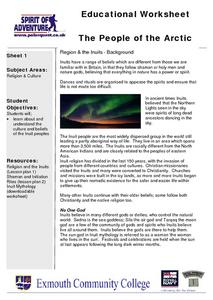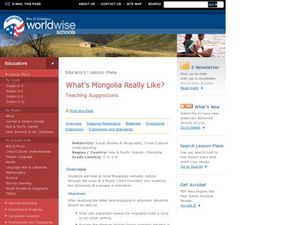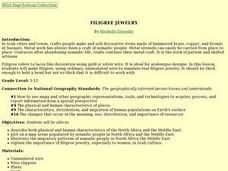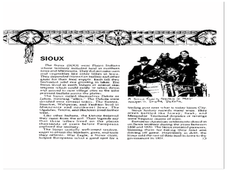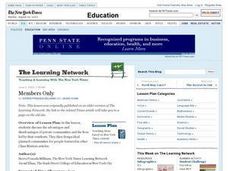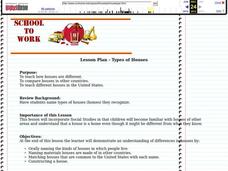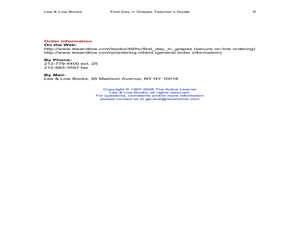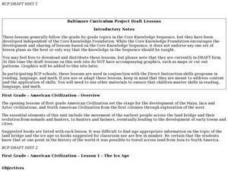Global Oneness Project
The Value of Ancient Traditions
Imagine having to give up cell phones, computers, and TV? What would be lost? What gained? An examination of the Drokpa, a nomadic people who live in the grasslands of Tibet, provides class members an opportunity to consider how access...
Curated OER
People of the Arctic
Read to learn all about the religion and belief systems of the Arctic-dwelling Inuits. This resource includes an easy-to-follow reading passage that is seven paragraphs in length, and five great critical thinking questions.
Curated OER
What's Mongolia Really Like?
Students discover the people of Mongolia. In this social studies lesson plan, students look at the Mongolian nomadic culture by reading a letter written by a member of the Peace Corps. They describe the different types of communities...
Curated OER
Tent Textiles
Learners explore the lives and cities of the people of Mali. After reading the story "Mansa Musa," they discuss the illustrations in the story and which story elements are facts and which are embellishments. Students create their own...
Earth Day Network
The Neolithic Revolution
With the abundance of food products we can easily access in our society today, it is easy to forget the toll this can take on our global environment. Young learners will discover how the transition to agriculture and domesticated living...
Curated OER
Nomadic Living
Students describe what it means to be nomadic and the advantages and disadvantages of living this type of lifestyle. After watching a video, they pretend they are nomads and must develop a list of items to take along with them. They...
Curated OER
Nomad Land
Students explore the migratory movements of animals as they monitor their own movements throughout the school day. Climatic and feeding conditions are examined as cues for the movement.
Curated OER
Nomadic and Sedentary Tribes in Kansas
Seventh graders compare and contrast sedentary and nomadic tribe life. In this Native American culture lesson, 7th graders research primary documents about the Osage and Kiowa tribes. Students create a series of illustrations to be...
Curated OER
Drought, nomads and the price of peanuts
Students read two short text items, which describe different approaches to agriculture. They describe the likely advantages and disadvantages of each approach for farmers, commercial peanut buyers, the government, nomadic herdsman and...
Curated OER
Filigree Jewelry
Young scholars describe physical and human characteristics of North Africa and the Middle East, plot on a map areas populated by nomadic people in those areas, explain importance of filigree jewelry in Arab culture, and create their own...
Curated OER
Pack your Parfleche!
Imagine you are a Plains Indian, a nomad getting ready to follow a herd of buffalo. Now imagine what you would have to pack for your trip. Little ones examine images of a traditional parfleche (packing box), and then create packing lists...
Peace Corps
What's Mongolia Really Like?
Understanding different cultural experiences is a challenging and worthwhile objective throughout grade and content levels. This lesson facilitates an appreciation of rural Mongolian life through a simulation of being a nomadic teen...
Curated OER
Create your own Parfleche!
What is a parfleche? It is a box used by the Plains Indians to carry goods as they traveled. First, the class will discuss the uses of these highly ornate boxes and the nature of the Plains Indians' nomadic lifestyle. Then, the class...
Curated OER
Huichol Yarn Painting
Young artists of many ages apply yarn painting techniques in combining their ideas and their art. After viewing actual examples of yarn paintings created by the Huichol people, learners choose an important scene from their own lives...
Curated OER
Reindeer Herders
Students examine the life of of nomadic herders in Siberia. They read and discuss an article and maps from National Geographic, identify threats to this way of life, and write a letter to the Russian government identifying ways to...
Curated OER
Early Native Americans
Fourth graders locate on a globe where the land bridge was. They describe the progression of nomadic people into North America.
Curated OER
People for the Land: Native Americans in Iowa
Students identify Iowa's American Indian cultures and complete a research project for the topic. In this Iowa's American Indian instructional activity, students research read the background information about tribes in Iowa and complete a...
Curated OER
Lesson 6: Native Americans in the West
Students recall their knowledge of Native American people who lived in the West and reflect on how their perspectives differed from pioneers and argonauts of the 19th century.
Curated OER
Ways we are Alike/ Ways we are Different
Students complete a chart comparing and contrasting African villages with their own communities. The lesson focuses on the Mbuti and Fulani people. They explore their style of living, their traditions and everyday life in these villages.
Curated OER
Members Only
Students discuss the advantages and disadvantages of private communities and the lives led by their residents. They design ideal planned communities for people featured in other Class Matters articles.
Curated OER
Types of Houses
Learners orally name the kinds of houses in which people live. They name materials used in building houses in other countries. They construct a house.
Curated OER
First Day in Grapes
Students read about a boy's first day in a new school. In this self-esteem lesson, students discuss the problems Chico has in his new school and how he faces them with courage and bravery. Students discuss people who migrate from other...
Curated OER
American Civilization - The Ice Age
First graders discuss the Ice Age land bridge over the Bering Straits and how it affected the population of the Americas. They construct a clay model of the land bridge and research common animals of the time.
Curated OER
What's Mongolia Really Like?
Students look at rural Mongolian nomadic culture through the eyes of a Peace Corps Volunteer and examine the dynamics of a people in transition. They give one important reason for migration from a rural to an urban setting and explain...

